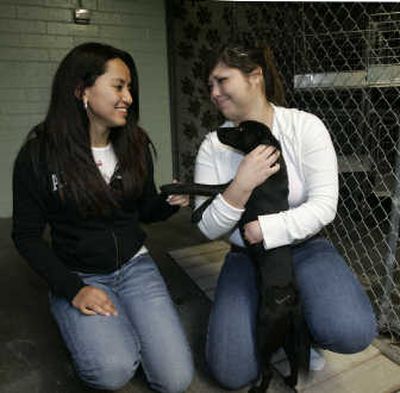Mortgage crisis leads people to dump pets

STOCKTON, Calif. – The house was ravaged, its floors ripped, walls busted and lights smashed by owners who trashed their home before a bank foreclosed on it. Hidden in the wreckage was an abandoned member of the family: a starving pit bull.
The dog found by workers was too far gone to save – another example of how pets are becoming the newest victims of the nation’s mortgage crisis as homeowners leave animals behind when they can no longer afford their property.
Pets “are getting dumped all over,” said Traci Jennings, president of the Humane Society of Stanislaus County in Northern California. “Farmers are finding dogs dumped on their grazing grounds, while house cats are showing up in wild cat colonies.”
In one such colony in Modesto, two tame cats watched alone from a distance as a group of feral cats devoured a pile of dry food Jennings offered.
“These are obviously abandoned cats,” Jennings said. “They’re not afraid of people, and they stay away from the feral cats because they’re ostracized by them.”
The abandoned pets are overwhelming animal shelters and drawing fury from bloggers, especially as photos of emaciated animals circulate on the Internet.
The first people to enter an abandoned house, such as property inspectors and real estate brokers, have discovered dogs tied to trees in backyards, cats in garages, and turtles, rabbits and lizards in children’s bedrooms.
No one keeps track of the numbers of abandoned pets, but anecdotal evidence suggests that forsaken animals are becoming a problem wherever foreclosures are climbing. Stockton and Modesto have some of the nation’s highest foreclosure rates.
Despite months of warning before a foreclosure, many desperate homeowners run out the clock hoping to forestall an eviction. Then they panic, particularly if they are moving to a home where pets are not permitted.
The situation has become so widespread that the Humane Society urged homeowners faced with foreclosure to take their animals to shelters.
Shelters are trying to keep up, but the spike in abandoned pets comes at a time when fewer people are adopting animals. Home sales are plunging to their lowest level in decades, and new homeowners are often the most likely to seek a pet.
Even people who are buying homes are not adopting pets.
“People are not bringing home puppies because times are tough, and animals cost money,” said Sharon Silbert, president of Animal Rescue of Tracy, a community near Stockton.
The San Joaquin Animal Shelter in Stockton is fielding more desperate calls from animal owners about to be evicted. Many call as a last resort after being turned down by various rescue groups with no room for more animals.
“They’re usually breaking down on the phone,” said Kathy Potter, a shelter dispatcher. “I’m quite direct with them that there’s a 50-50 chance the animals might be put down.” Still, shelter operators say, half a chance is better than none.
“They may be euthanized at a shelter,” said Stephanie Shain, of the Humane Society of the United States. “But they’ll be fed and have water and have a humane euthanization, as opposed to spending the last days of their lives eating carpet or wallboard.”
Some critics say the pet owners have already proved they are irresponsible by buying houses they could not afford or mortgages they did not bother to understand.
“They see a pet as property, no different than a worn sofa tossed into the alley when the springs pop,” says a posting about foreclosure pets on About.com.
The problem is exacerbated because most people grappling with foreclosure are returning to rental housing or moving in with relatives – two situations where it can be difficult or impossible to bring pets.
“What we’ve always known is that when times are hard for people, they’re hard for their pets,” said Stephen Zawistowski, a vice president at the American Society for the Prevention of Cruelty to Animals. Abandoning animals is illegal in most states under anticruelty laws, but the laws are not rigidly enforced.